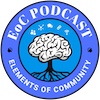The #1 Way To Transform Yourself & Your Community
Tune into Episode 26 of the Elements of Community podcast to explore how connection with others can unlock a whole new perspective for you. Join Sanyika on his inspiring journey from east coast roots to a life-changing walkabout to Los Angeles where he uncovered what true identity, purpose, and community means for him. As an ode to this exploration he launched “All In Man,” providing men all over the world with newfound strength to step up and be the men their communities need!
Sanyika is an inspiring leader who knows words have immense power and encourages their intentional use to build strong relationships within families, communities, and the world. He dedicates himself to helping men become better leaders so they can be a positive force for good in life’s journey – understanding individual needs while cultivating meaningful connection among all people in your community.
Growing up without a father, Sanyika knows firsthand the importance of having strong male role models in our lives – even if they’re not your biological father. Despite his own challenges and lacking connection to his dad, he chose to rise above it all by showing leadership as an example for others.
His powerful story encourages us all to take action no matter our circumstances and to be present both personally and professionally in order to become better versions of ourselves and make lasting positive contributions within families and communities around the world.
Prepare to be motivated, energized and inspired! Sanyika brings the heath in this episode, and along the way you will discover some of his secrets to becoming a better leader and an influential man in your community. If you’re ready to take your relationships to the next level by understating the power of language, then take the time to listen to this episode today!
Other subjects we covered on the show:
- We talked about how most people don’t want to enter into a conversation when they’re asked how they’re doing because they don’t want to share their problems – and how this affects their ability to lead.
- We also talked about how the body is constantly making chemical cocktails we call emotions and how we should be interacting with them.
- We even had a disagreement about whether or not technology has not outpaced our ability to do good. Tune in for this… it’s a good conversation.
- We discussed what love feels like. It’s being seen and heard with care. To extend this love to others, we must first see and hear them ourselves.
- We also talked about how leadership is not about being on top of a hierarchy, but rather understanding the individual needs of people in a group.
If you want to know more about Sanyika “The Firestarter” Street, you may reach out to him at:
- Website: https://theallinceo.com/
- LinkedIn: https://www.linkedin.com/in/theallinceo/
